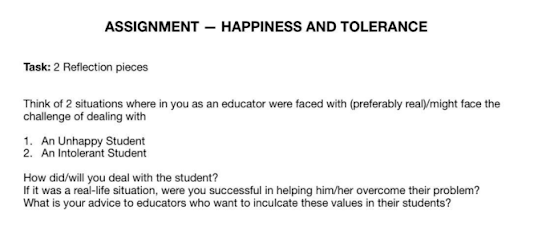SITUATION 1
Last year, one of the teachers found a student who could neither study nor socialise with her peers. She was not interested in any of the schoolwork or homework. When the exams came up, she got failed. When the teacher asked her why, she didn't say a word and remained silent. So the teacher tried to call her parents, but no response was received from them.
Last year, one of the teachers found a student who could neither study nor socialise with her peers. She was not interested in any of the schoolwork or homework. When the exams came up, she got failed. When the teacher asked her why, she didn't say a word and remained silent. So the teacher tried to call her parents, but no response was received from them.
On the day of the PTM, the teacher talked with her cousin (who came to attend the PTM). She then learned that the child's parents abandoned her, and she no longer lives with them. She feels more lonely after seeing other students having a good time with their parents. Days and nights, she is spent crying, missing her parents. She is no more willing to do anything that anyone is asking her to do.
How did the teacher deal with the student in this situation?
The teacher asked her peer group -
• to make her feel included every time and be a little polite towards her so that she will feel less lonely (VALUE- Love and Affection).
• Invite her to various group & solo activities (VALUE - WORKING TOGETHER).
• Have lunch with her (VALUE-SHARING).
• Try to be as much friendly as they can (VALUE - FRIENDSHIP/ BEING FRIENDLY).
• Make every moment special for her (VALUE- IMPORTANCE).
If it was a real-life situation, were you successful in helping him/her overcome their problem?
Yes, it was a real-life situation, and the teacher could help that student, and she even showed significant improvement in her studies and other curriculum activities. Even she started feeling important in her class and improved her loneliness.
Advice to the educators:
Before scolding or giving any sort of punishment -
• talk to the child
• understand his/her situation
• make him/her feel at home at school.
• act like his/her mother or father when required.
• stop comparing the students with each other.
Before scolding or giving any sort of punishment -
• talk to the child
• understand his/her situation
• make him/her feel at home at school.
• act like his/her mother or father when required.
• stop comparing the students with each other.
• motivate them
SITUATION 2
A student used to continuously disturb the class between lectures, roaming here and there unnecessarily, not completing his work, and not bringing his books and notebooks. Sometimes he misbehaved that he used to get scolded by everyone, but his behaviour remained unchanged, and instead of showing improvement, he got worse and was getting intolerable. Even his parents were very disturbed by his behaviour.
A student used to continuously disturb the class between lectures, roaming here and there unnecessarily, not completing his work, and not bringing his books and notebooks. Sometimes he misbehaved that he used to get scolded by everyone, but his behaviour remained unchanged, and instead of showing improvement, he got worse and was getting intolerable. Even his parents were very disturbed by his behaviour.
How does the teacher deal with the student in this situation?
One day the teacher decided to confront and counsel him after the class.
• Firstly, she pampered him.
• Then, politely, she asked him about the reason for his behaviour and if something was troubling him. And when she heard his reply, she was astonished. He confessed some heart-touching feelings. It was that whether it was at home or school, the child was facing negligence. Due to the lack of attention, he started behaving savagely; all the frustration he got from people who made him feel unwanted and unnoticed was bursting. Even when he wanted to confess his feelings, there was no one to hand an ear to him and the irony was everyone now became harsh and rude towards him. So he got habitual to this new behaviour cycle.
- By listening to these words, the teacher decided -
• to talk with his parents (VALUE - DISCUSSION) regarding what he shared.
• Instead of scolding him, she gave him more positive attention (VALUE - IMPORTANCE).
• Started analysing his behaviour and giving him personal advice (VALUE - GUIDING).
• In front of the class, instead of scolding and giving him punishment, the teacher started
appreciating him for his little efforts(VALUE - APPRECIATING).
If it was a real-life situation, were you successful in helping him/her overcome their problem?
Yes, this is a real-life situation, and the teacher was able to help that student. It took a lot of time & effort to improve that child, but in the last, he improved his academics and became one of the best and most lovable children in the class.
Advice to the educators -
Everyone has a story, and so do the students. So instead of reacting,
• First, as a human, understand the reason behind every child's act.
• Secondly, discuss as many things as possible with the parents regarding the child's behaviour
and counsel them and their parents.
• Instead of scolding, find a way to help the teacher, parents, and child overcome
such a situation with a positive attitude.
Avighna @ RPK School Moradabad
Ritika, Neeru, Shwetank, Evon, Swadha, Saymeen and Deeksha


